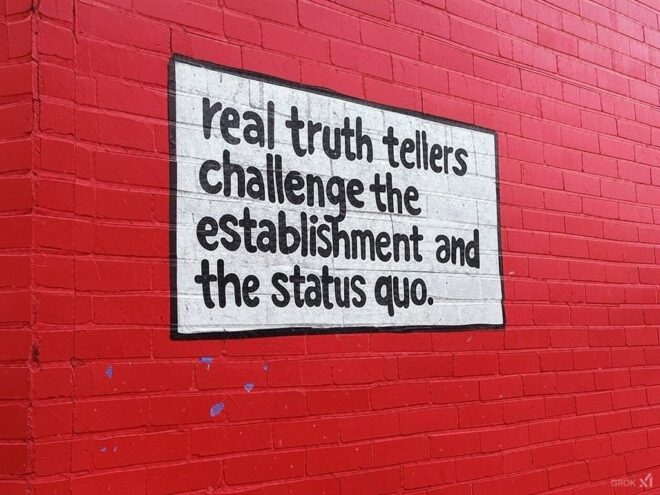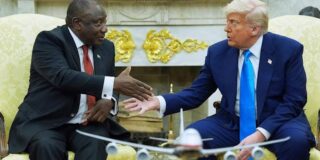
For centuries, modern societies have depended on something so ubiquitous, so ordinary, that we seldom stop to consider its importance: trust. The extraordinary ability of millions to share common understandings of reality is a fragile achievement—one far more tenuous than we often recognise.
When public institutions such as the media, government bodies, or professional organisations are widely trusted, we rarely question how that trust is sustained. Yet at the foundation of thriving liberal democracies lies a remarkable collective assumption: that when politicians, journalists, experts, or officials present information, they do so with honesty and integrity.
The belief that public figures and professionals are inherently trustworthy has been fundamental to the operation of representative democracies. At its core, liberal democracy hinges on the idea that a small group of elected leaders can act on behalf of millions. For this to work, there must be a basic level of trust that these representatives will occasionally prioritise the common good over their personal interests. As the last decade has made starkly evident, few things undermine democracy faster than the widespread perception – accurate or not – of corruption: the belief that politicians are exploiting their power for personal gain.
This reliance on trust extends well beyond politics. Much of what we accept about the world is not drawn from personal experience but from information conveyed through governments, media, experts, and other intermediaries. While we may occasionally witness an event firsthand, most of our understanding is built on trust in seemingly reasonable accounts. For example, we accept reports of economic growth or medical advancements without questioning the integrity of the researchers or journalists who relay that information.
In essence, what we often refer to as “truth” is underpinned by a framework of trust. Take climate change: scientists collect and analyse data, prepare research papers, and submit their findings for peer review by anonymous experts, who in turn trust the validity of the data. Once published, university press offices distribute summaries that journalists (ideally) report accurately. Civil servants then craft government policies based on these findings and write speeches detailing the intended responses.
Modern liberal societies are intricately woven together by networks of trust – an intricate web of reports, records, testimonies, and accounts. These systems, however, have always been politically vulnerable. The roots of modern expertise trace back to the late 17th century, when scientists and merchants began developing methods for documenting and sharing facts. Governments quickly adopted these practices for tasks such as tax collection and public finance. To ensure integrity, strict codes of conduct were introduced early on to prevent exaggeration or self-serving behavior by officials and experts.
Yet, even in honest systems, the exclusivity and uniformity of these early networks – typically dominated by white, male graduates from elite universities and affluent cities – sparked suspicion. While this does not invalidate their knowledge, problems emerge when such networks begin to resemble a uniform political class with shared interests. This perception fueled the notion of “elites” – a view that sees once-distinct fields such as the media, academia, politics, law and business as an interconnected and self-serving group.
Compounding this challenge, systems based on trust are inherently susceptible to abuse. Individuals who wield authority may exploit their positions for personal gain. While modern governance relies heavily on documentation to verify facts, these records can still be falsified, suppressed, or edited to serve ulterior motives. This vulnerability cuts across numerous fields; for example, faith in a newspaper accurately reporting a police officer’s account of a reliable witness ultimately requires a leap of trust.
Over the past few decades, trust in public institutions has been steadily eroding throughout the Western world. Surveys consistently confirm this downward trend. Between the 1990s and early 2000s, declining trust had become a significant concern for policymakers and business leaders, who worried it would lead to social fragmentation, crime, and other costly consequences.
What few foresaw was the tipping point – when trust falls below a critical threshold, large portions of society begin to perceive politics and public life as entirely illegitimate. This shift occurs not because trust diminishes across the board, but because key figures – politicians and journalists, in particular – are increasingly seen as untrustworthy. These individuals, tasked with representing society and providing impartial information, have lost public credibility.
To address the challenges liberal democracy faces today – whether categorised as “populism” or “post-truth” – it is not enough to decry growing public cynicism. We must examine why trust is eroding in the first place. The infrastructure supporting facts has been destabilised, partly by technological advances and market dynamics, but also by the uncomfortable legitimacy of some populist critiques of the establishment. Too often, populist movements and figures are treated as the root of liberalism’s troubles when, in reality, they are symptoms of deeper structural issues. By focusing on trust – and why institutions have failed to maintain it – we can better understand why this crisis is unfolding now.
One problem lies in the fact that many of populism’s instincts are repeatedly validated. Digital technology, in particular, has created vast reservoirs of data capable of challenging official narratives and destabilising institutions. While it is difficult to definitively prove a politician’s sincerity or a journalist’s impartiality, it is much easier to expose dishonesty. Scandals, leaks, whistleblower disclosures and fraud revelations have fueled public suspicion at an unprecedented pace. Trust requires a leap of faith, but distrust is continually reinforced by mounting evidence. In Britain, much of this evidence has emerged far more rapidly than many are willing to admit.
As populist leaders and movements gain traction, some commentators have attributed the crisis of liberal democracy to economic factors – a backlash from those marginalised by globalisation and growing inequality. Others link it to cultural tensions over identity and immigration. Both perspectives hold validity, but neither fully addresses the root cause of the trust collapse that populist figures so adeptly exploit. The vulnerability of liberalism today lies in the deteriorating assumption that mainstream politicians, journalists and officials are acting with integrity.
While the rise of figures like Donald Trump and movements like Brexit has provoked myriad theories, there has been insufficient scrutiny of the narratives advanced by populists themselves. Central to their message is a relentless critique of “elites” – accused of preserving a self-serving status quo. On the right, leaders like Nigel Farage claim civil servants sabotaged Brexit to protect their interests. On the left, figures like Jeremy Corbyn rail against Britain’s “rigged” economic system. Promises to tackle corruption and end corporate lobbying feature prominently in the rhetoric of leaders like Donald Trump, Jair Bolsonaro, and Viktor Orbán.
Yet one of the most remarkable developments in recent years is how distrust in “elites” has been weaponised by individuals often surrounded by far more controversy – and often far more wealth – than the technocrats or politicians they seek to displace. It seems paradoxical that figures like Donald Trump or Arron Banks, both riven with scandals, have benefited from anti-elite sentiment. But their authority does not rest on moral virtue; it stems from the perception that they are willing to expose the wrongdoing of “insiders” in the media and government.
The centuries-old practice of entrusting a select group of elites to discern, communicate and evaluate truths on our behalf may no longer be sustainable, at least not in its current form. It’s tempting to dream of reversing the forces that have eroded this system or fighting back with an even larger arsenal of facts. Yet this ignores the deeper shifts in how trust itself is evolving.
In the emerging landscape, truth is increasingly viewed as residing not in openly accessible facts but in concealed troves of data. Scandals such as the MPs’ expenses debacle, the Iraq war logs, and more recently, the #MeToo movement highlight this shift. These events were marked by abrupt and overwhelming disclosures that triggered crises of trust. The truth wasn’t absent – it was simply hidden, waiting to be unearthed. In an era dominated by email, social media and smartphone cameras, it has become second nature to assume that nearly every aspect of social behavior generates a trail of raw data that exists somewhere. Truth now resembles molten lava beneath the earth’s surface, erupting sporadically like a volcano.
This raises a pressing question: what role remains for traditional, analogue conveyors of facts and stories? What does it mean to deliver news in a world increasingly defined by skepticism? For years, newspapers have wrestled with this dilemma; some have pivoted to acting as gateways to raw data or curators of others’ content. But the public no longer instinctively trusts journalists at their word when they can directly access digital evidence. Compelling responses to these questions may exist, but they’re far from apparent.
Amid these changes, a new type of truth-teller has come to prominence: individuals who dare to challenge the establishment, whether it’s government agencies, corporations, political parties or the media. Some are whistleblowers, others are political figures, while some fall into categories like conspiracy theorists or provocateurs. The complication is that everyone chooses their own so-called heroic truth-teller, depending on the specific “nonsense” they feel most compelled to confront. There’s no ideological connection between figures like Chelsea Manning and Nigel Farage; their only shared trait is a willingness to defy authority and disrupt consensus.
If this world of personalised truth-tellers sounds uncomfortably close to relativism, it’s because it is. But the roots of this unsettling “truth regime” run deeper than just the rise of populism or the era of big data. The real problem is trust, not facts – something elite institutions have failed to fully grasp. This inability to recognise the rapid decline of their own credibility has left them blindsided.
Unless liberal institutions and their defenders acknowledge their failure to sustain trust, they will continue to misinterpret the upheavals of the past decade. Moreover, unless these institutions reconnect with the original liberal ideals – to safeguard the separation of powers and prioritise the unbiased pursuit of knowledge over profit – the current trajectory will only accelerate. Facts alone won’t be enough to push back against these trends. Power and authority will increasingly consolidate in the hands of illiberal states and digital platforms, interrupted only by sporadic public outcry when new scandals are exposed and whistleblowers make waves.


